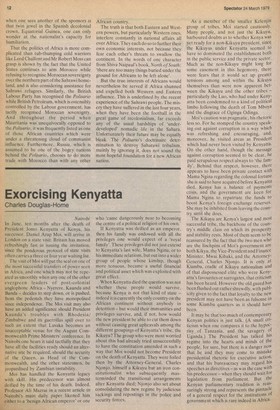Exorcising Kenyatta
Charles Douglas-Home
Nairobi In June, ten months after the death of President Jomo Kenyatta of Kenya, his successor, Daniel Arap Moi, will arrive in London on a state visit. Britain has moved refreshingly fast in issuing the invitation, since the ponderous protocol of state visits often carries a three or four year waiting list.
The visit of Moi will put the seal on one of the most successful transfers of power seen in Africa, and one which may not be repeated as smoothly when any one of the other evergreen leaders of post-colonial anglophone Africa — Nyerere, Kaunda and Banda — decides to step down, or is pushed, from the pedestals they have monopolised since independence. The Moi visit may also have an added significance should President Kaunda's troubles with Rhodesia/ Zimbabwe and its guerrillas spill over to such an extent that Lusaka becomes an unacceptable venue for the August Commonwealth Prime Ministers' conference. In Nairobi one hears it said tactfully that they have all the facilities ready should an alternative site be required, should the security of the Queen. as Head of the Commonwealth, and the other statesmen, be jeopardised by Zambian instability.
Moi has handled the Kenyatta legacy with skill. His predecessor was almost deified by the time of his death. Indeed, Professor All Mazrui in a recent article in Nairobi's main daily paper likened him either to a 'benign African emperor' or one who 'came dangerously near to becoming the centre of a political religion of his own.'
If Kenyatta was deified as an emperor, then his family was endowed with all the privileges one would expect of a 'royal family'. These privileges did not just extend to Kenyatta's last wife, Mama Ngina, or to his immediate relations, but out into a wider group of people whose kinship, though more tenuous, became a useful financial and political asset which was exploited with great effect.
When Kenyatta died the question was not whether these people would survive, because Kenya is not that kind of state — indeed it is currently the only country on the African continent without anybody in detention — but would their immunities and privileges survive, and, if not, how would the new president be able to cut them down without causing great upheavals among the different groupings of Kenyatta's tribe, the Kikuyu? The group who were most worried about this had already tried unsuccessfully to have the constitution amended in such a way that Moi would not become President on the death of Kenyatta. They were foiled then by the Attorney-General, Charles Njonjo, himself a Kikuyu but an iron constitutionalist who subsequently masterminded the transitional arrangements after Kenyatta died; Njonjo also set about consolidating the new regime by judicious sackings and repostings in the police and security forces. As a member of the smaller Kelenjin group of tribes, Moi started cautiously.
Many people, and not just the Kikuyu, harboured doubts as to whether Kenya was yet ready for a non-Kikuyu president, since the Kikuyus under Kenyatta seemed to have so dominated the establishment both in the public service and the private sector. Much as the non-Kikuyu might long for some easement in this hegemony, there were fears that it would set up greater tensions among and within the Kikuyu themselves than were now apparent between the Kikuyu and the other tribes — particularly the Luo, who had under Kenyatta been condemned to a kind of political limbo following the death of Tom Mboya and the disgrace of Oginga Odinga. Moi's caution was pragmatic; his rhetoric less so. For he stomped the country speak ing out against corruption in a way which was refreshing and encouraging, and, moreover, he visited areas as President which had never been visited by Kenyatta.
On the other hand, though the message against corruption seemed to be clear, he paid scrupulous respect always to 'the fam ily'. Behind that respect, however, there appears to have been private contact with Mama Ngina regarding the colossal fortune she is said to have acquired before Kenyatta died. Kenya has a balance of payments crisis, and the government are keen for Mama Ngina to repatriate the funds to boost Kenya's foreign exchange reserves. She may be inhibited from leaving the country until she does. The Kikuyu are Kenya's largest and most successful tribe, the backbone of the coun try's middle class on which its prosperitY and stability rests. Most of them seem to be reassured by the fact that the two men who• are the linchpins of Moi's government are both Kikyu, the Vice-President and Finance Minister, Mwai Kibaki, and the Attorney General, Charles Njonjo. It is only at Kiambu, cradle of Kikuyu nationalism and of that dispossessed elite who were KenY atta's favourites or surrogates, that criticism has been heard. However the old guard has been flushed out rather shrewdly, with publicity given to the fact that loyalty to the new president may not have been as fulsome in some Kiambu quarters as it should have been.
It may be that too much of contemporary Kenyan politics is just talk. (A small cri ticism when one compares it to the hypoc risy of Tanzania, and the savagery of Uganda.) The President has talked his regime into the hearts and minds of the people, for sure, but there is a danger now that he and they may come to mistake presidential rhetoric for executive action, and that his bureaucracy may regard his speeches as directives — as was the case with his predecessor — when they should wait for legislation from parliament. But the Kenyan parliamentary tradition is reas suringly strong and represents the pinnacle of a general respect for the institutions of government which is rare indeed in Africa.


































 Previous page
Previous page